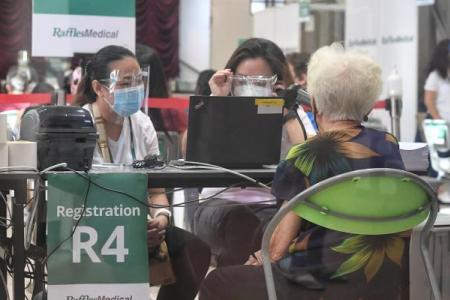Bigger push to encourage seniors to get vaccinated: Health Minister
We'll go 'knocking on their doors if necessary', says Health Minister, who urges community, family to help
The good news: More seniors are getting vaccinated. The not so good: It is still not enough.
Minister for Health Ong Ye Kung said during a virtual press conference by the multi-ministry task force on Covid-19 yesterday that the vaccination rate for those above 70 years of age is now 71 per cent, from under 70 per cent in the last update on June 24.
However, 71 per cent is still a far cry from the figure that Mr Ong hopes to see - close to 90 per cent of seniors vaccinated.
"Those above 70 have the lowest first dose and booking rates. It really should be the other way round, we really ought to have them have the highest percentage," he said.
Stressing the importance of convincing seniors to get vaccinated as they remain the most vulnerable, Mr Ong pointed to how, in countries with higher vaccination rates that have opened up, most of those who have suffered severe illness from Covid-19 are still the elderly.
Among people over 70 years old, 71 per cent have had at least one dose of the vaccine, or have booked an appointment, he said.
For those aged 60 to 69, the figure is 85 per cent. For those who are 50 to 59, as well as 40 to 49, it is 86 per cent.
For those aged 30 to 39, the figure is 78 per cent. For the 20- to 29-year-olds, it is 80 per cent, and it is the same for those aged 12 to 19.
Mr Ong, co-chair of the task force, said that in countries such as the United Kingdom, United States and Israel, which have opened up, infections have also gone up among young people as they are out and about and less vaccinated, although hospitalisation and severe illness numbers are "quite stable, but mostly among the old".
He added: "It is not a matter of the elderly saying, 'I don't go out therefore I'm safe'... because these days when we look at our infections and our cases, many of our infections have actually occurred at home. Family members can go out and bring the virus back home."
Announcing that the authorities will be making a bigger push to reach out to seniors, "knocking on their doors if necessary", Mr Ong urged more people to encourage seniors to get vaccinated.
"This is the work we need to do, so any one of us, if we know of an elderly person, a neighbour or a relative who is still hesitating, please help reach out to them and persuade them," he said.
Singapore Management University (SMU) researcher Micah Tan, who recently conducted a study on why some seniors still continue to resist Covid-19 vaccines, agree that the responsibility to get more older adults vaccinated does not lie with only the Government.
Singaporeans, too, should play a part in encouraging older relatives or friends to get vaccinated and supporting them through the process, like accompanying their older relatives to get their vaccinations and taking care of them if they experience any side effects, he said.
Mr Tan, the lead author of the study conducted by SMU's Centre for Research on Successful Ageing, said a survey of 7,288 respondents showed that older adults who were hesitant placed the greatest amount of trust in their family members for information on Covid-19.
TRUSTED VOICES
Mr Anthony Tay, chairman of Lion Befrienders, which serves mostly the elderly with little or no family support, agreed that seniors tend to trust those "who support them on a daily basis" and would be more likely to heed their advice.
"It might be more effective to educate them through the people they interact with."
Madam Kam May Yoke, 61, is a hawker assistant who eventually managed to convince her 86-year-old mother, who lives in Redhill, to get vaccinated.
"We felt it was really unsafe and that we need to take the necessary precautions now."
However, the in-laws of Ms Josephine Chin, who are in their 60s, are still extremely unwilling to get vaccinated.
Ms Chin, who works in a bank, suggested "monetary benefits" or taking away their "everyday benefits", such as not allowing them to leave the house, go to the market or coffee shop, to push them to get vaccinated.
But SMU's Mr Tan said punitive measures may not be the best solution.
"Older adults have already had a very difficult time during the pandemic and such drastic measures would be significantly detrimental to their mental well-being," he said.
Mr Tan said it is important for people to not be critical of unvaccinated seniors.
"Many of them are worried for their safety, and we need to strive to reassure them by listening to and addressing their concerns, and to more generally adopt a posture of empathy towards their worries," he said.
Lion Befrienders told TNP it has been equipping its staff and volunteers with information so that they can advise its seniors during home visits and assist them with the booking of vaccination slots.
"Our staff and volunteers will also answer questions and educate the seniors on the vaccination process, how the vaccines will protect them, and side effects to look out for," said Mr Tay.
The Agency for Integrated Care's (AIC) outreach arm, Silver Generation Office (SGO), said it, too, has been engaging seniors through house visits and telephone calls since February, together with the People's Association.
AIC told TNP that most of the seniors were generally receptive to being vaccinated.
For those who are hesitant, SGO will engage them again to listen to and understand their reservations, and help reassure them about the vaccination.
Get The New Paper on your phone with the free TNP app. Download from the Apple App Store or Google Play Store now


